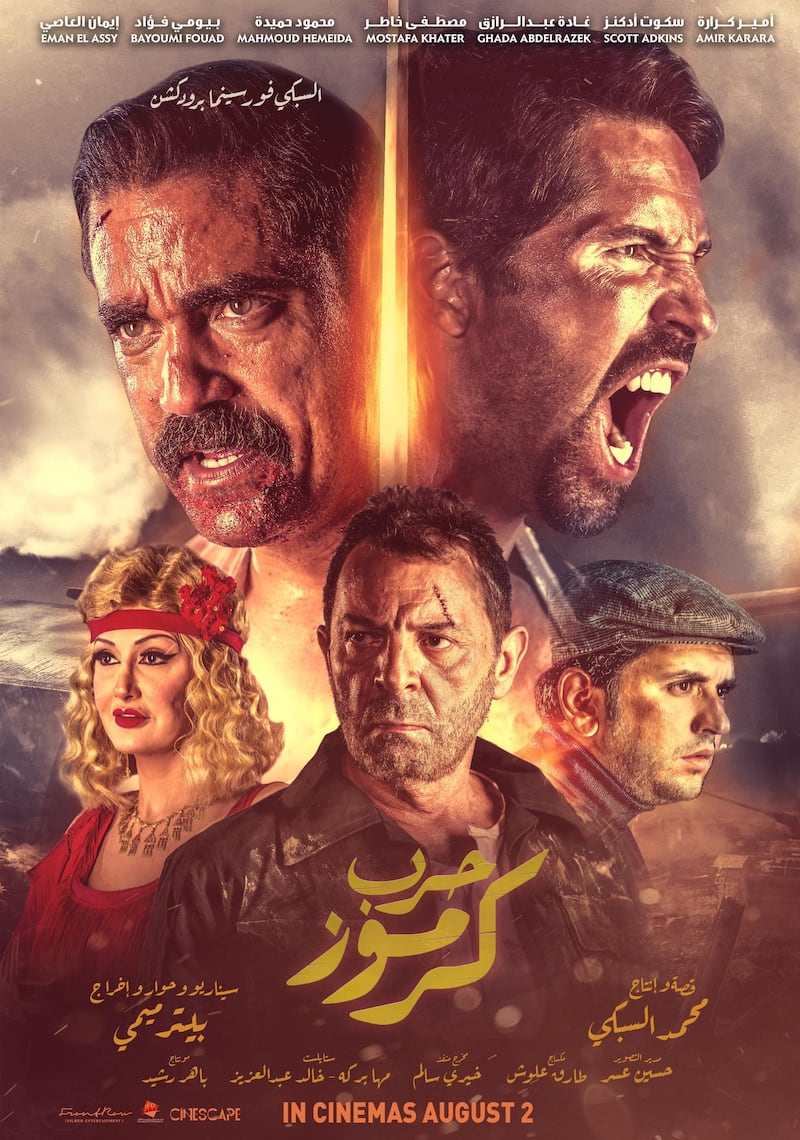Egyptian popular culture has long celebrated the subject of anti-colonialism, with the voracious consumption of international but popular anti-colonial films like Moustapha Akkad's Omar Al-Mukhtar (1981), Amitabh Bachchan's Mard (1985), or even Mel Gibson's Braveheart (1995). The country also created its own artistic tome on the topic after the end of British presence in Egypt in the 1950s, with songs, films, series, ballads and visual arts all exploring the theme.
Following on with that tradition is Peter Mimi's new action film Harb Karmouz (Karmouz War). It was released in Egypt earlier this year and is screening in the UAE this week. It is written by both producer Mohamed El Sobky – a heavyweight name in Egypt's commercial cinema world – and the director Mimi.
The film is set in Egypt between the end of the Second World War in 1945 and 1949. The colonial 1940s set-up of the film, as well as the talented cast, elevated expectations of audiences hoping to finally see a well-made Egyptian war film. Unfortunately, it is disappointing.
The film tells the story of Youssef Al-Masry, a lieutenant colonel in the Egyptian police, played by Amir Karara, who is a bull of a man with a dense moustache, hairy chest and masculine features. Al-Masry sets to avenge “the honour” of an Egyptian girl who was raped by two British soldiers. After fist fights and gun chases, one soldier gets killed and another is imprisoned. Al-Masry refuses to set that soldier free, leading the British army to surround his police station.
The characters seem influenced by novelist Naguib Mahfouz’s depiction of typical Egyptian alleys or neighbourhoods, featuring an ensemble cast that includes the usual characters of a patriotic police officer, a corrupt politician, a sex worker, a burglar, and a group of “bad” British officers and soldiers. However, these characters lack depth in Mimi’s script, which results in predictability – to the extent where it’s pretty obvious what is going to happen in each scene.
As the police station gets surrounded by tanks and heavily armoured British soldiers, Al-Masry sets free most of the prisoners, who become his comrades in arms to battle the onslaught. A patriotic sentiment seems to take over the characters out of nowhere. A sex worker, played by Ghada Abdel Razek, suddenly becomes the voice of reason and morale; a burglar, played by Mostafa Khater, uses his talent to help the cop, and a corrupt pro-British politician, played by Bayioumy Fouad, suddenly backs the sieged policemen.
In many ways, Harb Karmouz resembles a socialist realism poster: as, like in the Soviet-inspired artistic movement of the 1950s and 1960s, all segments of one society are united under one vanguard to counter the imperialist. Nevertheless, Mimi deprives the audience of any attempt to think about why these characters have progressed or chosen to do what they do.
However, visually, the director has created a true action thriller, with several well-executed scenes bettering most of mainstream Egyptian cinema, and moving from fist fights to tank battles. But again, attention to the overall image and ignoring the details has cost the film.
For instance, the producers paid to bring in American actor and MMA expert Scott Adkins to play an English officer, and there are rather entertaining scenes in which Adkins and Karara engage in a fight that resembles a Jiu Jitsu match, rather than a fist brawl in a street, with the yelling and cursing all in a clear American accent.
To classify Harb Karmouz a "war film" would be a mistake, and to view it as a historical film an even bigger one. It is really just an attempt to create a blockbuster using a famous cast and strong patriotic sentiment.
The film's cinematography and soundtrack improve the image of the film, but not the plot. The soundtrack, for instance is heavily influenced by Hans Zimmer's Dunkirk score, and is used to transfer the audience from one fight scene to another, but not to introduce new characters or enhance the anxiety of the protagonist. The editing also includes very rough cuts.
Overall, Harb Karmouz is a well-made action film, but it's not the movie that one would expect given the generous reported budget and all of the hype.
Harb Karmouz is in cinemas across the UAE now
___________________________
Read more:
Haifaa Al Mansour is returning to film in Saudi Arabia
Manav Bhalla on his Dubai movie and Om Puri's final performance
Review: Even Anil Kapoor can't save 'Fanney Khan'
___________________________





